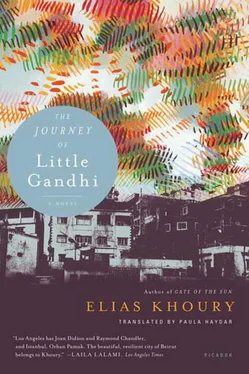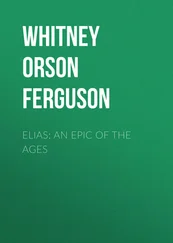Lillian Sabbagha told quite a different story.
She said the Reverend tried to rape her. She went to the priest, Father John, kneeled before him in the confessional, and told him whatever came to her mind. Father John didn’t say anything to her. He knew she wasn’t completely balanced mentally, that she spoke illogically, and that the whole affair was shameful. Did it make sense that the poor Reverend would push her from the window and rape her? It seemed the woman had lost her mind since the death of her white Russian maid.
In that maid Little Gandhi, saw the image of the white angel. She’d pass by him, with that head of hers, which was always held high, and that back, which never bowed down to anyone. And she’d tell him to come and get the shoes. Never once did she bring him a single shoe. She’d stand next to him without looking down where he was sitting next to his shoe-shine box, in front of the row of shoes lined up on the sidewalk. Gandhi would leave everything and go to pick up Madame Lillian and her maid’s shoes. The maid’s shoes were cleaner and more elegant than the madame’s.
Gandhi had no idea this woman was a Russian princess and that she worked for the Sabbagha family after she sold all the jewelry she’d brought with her from Russia. She was fifteen and had crossed continents and countries only to find herself in the port of Beirut, not Alexandria. She tried to find work, and she did, teaching French to local Beiruti children. But she was like someone who’s always waiting for something. Only Father John al-Mazraani knew the real story about her, and during mass he insisted on beginning Communion with her. She would stand first in line, wearing her white robe and orange sash, and the priest would bow to her with his chalice.
Madame Sabbagha was the one who let out the secret to everyone in the neighborhood. That was the day she found Vitsky dead in her small room. Madame Sabbagha shrieked and said, “The princess, the daughter of princes.” The neighbors came running. Abu Saeed al-Munla, Spiro with the hat, the teacher Ahmad, Husn, Dr. Atef, Alice, Zaylaa, and lots of women. They were all in front of the house. And when Lillian Sabbagha heard one of the women asking “What’s wrong with the maid?” she shouted “You, you’re the servants; this was a princess.”
The white princess was dead inside the house, sprawled out on her bed in her white nightgown, as if she’d known she was going to die. Her eyes were shut and her hands were folded together over the blankets. There was a faint smell of decay coming from the room.
Father John ordered everyone out and everyone went out except Madame Sabbagha. Then the doctor came and declared that the death had occurred at night, the cause being a heart attack.
Father John carried out the burial rites right away, but Madame Sabbagha insisted on having the bishop come and started screaming in the priest’s face. Everyone was at the house, which had suddenly filled up with nuns. Gandhi didn’t know where the nuns had come from, or how they’d entered the princess’s room. Everyone was in the entrance, which had been turned into a reception area, and the priest was saying there was a war going on and it was impossible for the bishop to come. And Madame Sabbagha screamed and wailed. Here the Reverend Amin stepped in and the scandal broke out. She attacked him, Gandhi said, and almost killed him. She shouted that he wanted to kill her and tried to rape her and throw her from the window. At that point, Gandhi said, Father John stopped the commotion and scooted the Reverend out the door. He promised Lillian he’d get in touch with the bishop.
The next day the bishop crossed the green line and came to the burial.
Alice told me that Father John al-Mazraani told her the whole story.
“Unbelievable. You know how it is. You must know. Things have a way of turning around with the passing of time. And this Russian woman was the turning point. Life didn’t turn around, she did. Oh, I don’t know.”
Alice said her friendship with Father John al-Mazraani began because she was concerned about the Reverend Amin during his last days. After she brought him to the nursing home in Ashrafiyyeh, Father John became her friend. She’d visit him in the late afternoon as he sat on the bench of Our Lady Church, drinking lemonade and telling her about Mary Magdalene. And she’d tell him about her life.
He asked her once why she didn’t come to church on Sundays.
“How can I, Father? I’m a Muslim.”
“A Muslim? I can’t believe it. You look like you could’ve studied at the nuns’ school.”
“I was a student of the whorehouse. It’s all the same, Father.”
The priest had become convinced that it really was all the same. There he was, living alone and isolated. His beard was going gray and the long hair he kept tied in a bun at the back of his neck was falling out. And the days passed, and the war took everyone away. There was no one left. They were all gone. Life now meant waiting for death. Father John, the priest of the Orthodox Church of Beirut, now felt that it was all the same in the end. Had he stayed in Hawsh Malab al-Salaam and become a soccer player, he’d have wound up exactly the same as he was now.
As a child he was ashamed of the “Hawsh” and he wasn’t really a Mazraani. It was the old senile Bishop Athanasios, God rest his soul, who stuck his family with the name “Mazraani” (Farmer). Father John, whose real name was Anwar Nasri, was born in Hawsh Malab al-Salaam. There he was born with hundreds of children, in stone shacks that were built next to the soccer field in Ashrafiyyeh in order to accommodate the Hurani immigrants who left the Suweida region in the 1920s during the great Syrian Revolution. People fled to Beirut. Women in long black robes, black headdress braided over their heads, tattoos covering their hands and chins, and behind them the children and the men. In Beirut, the men did construction work and the women worked as maids in people’s homes. They all lived in the Hawsh, which belonged to the Greek Orthodox Endowment Fund of the Beirut Diocese. Here Anwar Nasri was born and received a free education. His mother took him to the diocese because he had a beautiful voice. He lived in that luxurious building in the Sursuq Quarter of West Beirut. He ate like a king, studied theology, and carried the censer until he became a priest.
“I didn’t have the luck to become a bishop. Maybe it was because they saw me as just the son of a maid. Isn’t a maid a human being, too? Shame on them. But it’s better this way. My responsibilities are few, Alice. This way I’ll stand before Him with double the talents He gave me, and I won’t be scoffed at in the next world.”
From Ashrafiyyeh he went to Ras Beirut, and there he has lived for thirty years. He’d seen everything. He saw the city as it was being transformed into the Tower of Babel. He saw people speaking all languages, and he saw the faces as they turned into ruins of time. He’d seen it all, and now he sat on the stone bench, a glass of lemonade in his hand, aching with loneliness and listening to Alice’s memoirs and the stories of his neighbors, wanting a woman. Any woman. Our Father John had started confusing women in his mind, mixing names and faces, uncertain about who goes with what and where to begin. He’d see them before him like shadows coming and going, totally elusive to him. All the pleasures of this world had gone. Cholesterol and high blood pressure, there was only one pleasure that remained, words. Talking was the only delight Father John al-Mazraani couldn’t get enough of. He’d sit out in front of his church like a hunter waiting for his prey to be caught in the snare of his words.
That was how he told everyone the story of poor Vitsky, and each time he exaggerated the details a little bit.
Читать дальше












